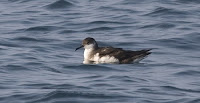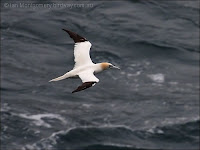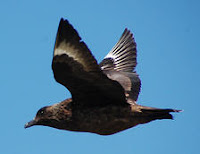
It was like an epiphany, spending five days learning how to use my binoculars and telescope. I'd never been in such a long relationship with them. I also learned how to manage my expectations. When you see a figure like 3024 Manx shearwaters in that period, it’s tempting to think they were streaming past. Divide that number by the 3600 minutes that twelve hours a day makes and the stream reduces to a trickle. Add the fact that shearwaters also tend to clump into groups of anything up to twenty and there's actually an awful lot of quietness out there.
We did have the constant company of gannets. Who could complain about that? The local shags and fulmars also went about their business. And the paperwork kept us busy. Every hour we monitored the state of the wind, clouds, sea and its glare. To get an accurate reading for the wind meant a scramble up 50 metres to the top of the cliffs. Twelve times a day for five days... strewth, I climbed the equivalent of three Munros. No wonder my packed breakfast disappeared faster and faster each day.
The rhythm of scanning, recording and monitoring kept boredom at bay and gradually became the normal stuff of life. The rest of the world lost focus, turned unreal, irrelevant. Michael Jackson could have died and we wouldn’t have noticed (actually, he already had).
Back to 7:36 on the Sunday morning, I was yet to settle in to this pace. The first Balearic slipped past to set going another rhythm – ten that day; fifteen the next; and so on. We were counting beats, beats in the passage of sea life.
By eight o'clock the first of very few auks – a razorbill – had entered the records and my wind-climb produced a peregrine falcon. On the next hour I missed a passing great skua. Another pattern developed; it became a standing joke that the skuas would wait for me to start my ascent. My compensation that time was ravens and, at ten o'clock, a wheatear. The ensuing hour the Balearics peaked at four and I finally had a good enough view of one to honestly add it to my British list.
The morning ticked on. At twelve we broke for an hour, the period of maximum glare, then settled back to the rhythm. Before long, a sooty shearwater appeared, looking like a gigantic swift skimming the ocean. Another British first for me, we counted twelve in the entire five days.
A land-based distraction punctuated the afternoon: a pair of choughs probing the turf on the cliffs behind us. Meanwhile on the non-avian front Julie was having a quiet time until a basking shark appeared, quite close by. For me the day was indeed full of firsts.
And the weather held. We needed the umbrellas against twelve full hours of sunshine. It was a different story on the Monday. ⇐ ⇒





No comments:
Post a Comment